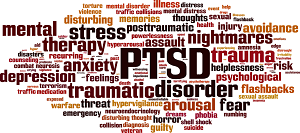If any of you were akin to me in your middle childhood, you were probably instructed to NOT do something regularly. The probability that I would listen to such demands was low, sadly very low. However, after feeling the punishment of not listening, either from a natural event or a disgruntled parent, I learned quickly to not engage in such an event again. The formation of memories allows us to grow and learn form painful experiences. What happens however, when such strong memories form from mundane events? This is were anxiety disorders such as PTSD can manifest. There are several neurological factors which are thought to cause these overactive memories and thus lead to a variety of anxiety disorders.
Glucocorticoids
One important factor that can contribute to the overactivation of strong memories are glucocorticoids. These hormones, which are often associated with fear and stress, have been to form a complex for with other enzymes in the brain thus allowing gene transcription leading to the formation of memory. Tests with various animal models show that animals treated with glucocorticoid agonists struggle much longer under various conditions instead of learning quickly from previous events. This leads to the conclusion that these glucocorticoids could be overactive in a variety of anxiety disorders thus producing strong memories from very mundane situations. The diagram below does a nice job of demonstrating how these glucocorticoids help in gene transcription.

The Role of the ERK/MAPK Pathway
It would be foolish to only discuss the role of glucocorticoids when the figure above also shows how the Erk/MAPK pathway involved in the formation of memory as well. In fact, both of these pathways must happen in tandem for the proper transcription of genes and thus memory formation. Since the Erk/MAPK pathway has already linked to learned behavior it makes sense that it may also play a role in memory. A series of studies found that a NMDA receptor agonist strongly inhibited the learning process during forced swim tests of rodents. In other words, the inhibition of the Erk/MAPK pathway prevents the formation of the glucocorticoid receptor/ERK complex, which in turn cannot phosphorylate MSK-1and Elk-1. It stands that if these two kinases cannot form then there can be no gene transcription which leads to a lack of memory consolidation. However, if the ERK/MAPK pathway is overactive you can have the over activation and phosphorylation of MSK-1 and Elk-1 which leads to the transcription of genes for mundane events.
Conclusion
The formation of memories is vital to not only our learning but also our survival. Memories can be formed through several pathways however, the formation of strong and or painful memories often occurs through the ERK/MAPK pathway along with glucocorticoids. It is thought that the overactivation of this process can lead to a variety of anxiety disorders, including PTSD. There are other aspects to be considered, such as the role of the amygdala and hypothalamus, both of which have been shown to play a role in anxiety. It is imperative that each these factors be more thoroughly examined in order to one day find a cure for those suffering with anxiety disorders.
Sources
Image
http://neurochemistry2019.pbworks.com/w/page/135908691/Making%20memories%20of%20stressful%20events
